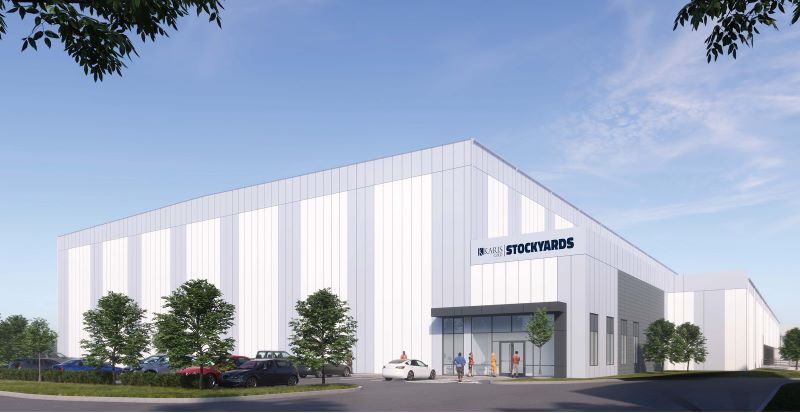May 2024
Chicago cold storage project will provide some relief to end users seeking coveted cold-storage space

Demolition is now underway at 3815 S. Ashland Ave. in Chicago’s Bridgeport neighborhood, construction work that will soon result in the development of a nearly 100,000-square-foot cold storage facility by private investment and development company Karis Cold.
The new facility that sits near Chicago’s Back of the Yards and McKinley Park neighborhoods will replace the long-empty and vandalized Continental Can Co. building. The facility will also help fill a serious need in the Chicago market.
John Basile, executive vice president with the industrial services group at Oakbrook Terrace, Illinois-based NAI Hiffman, the exclusive leasing agency for Karis Cold Stockyards, said that the demand for cold storage facilities in the Chicago market far outpaces the available supply. It’s why he expects the Karis project that will rise from land that once housed Chicago’s famed Stockyards will be mostly pre-leased before it opens in the spring of 2025.
“As a nation, we continue to grow in population. We want a different mix of foods. And the supply of functional cold storage space continues to decline,” said Basile, who is handling the leasing of 3815 S. Ashland Avenue. “These buildings have a lifespan. Once they reach that end life, they become functionally obsolete. They need to be torn down or converted into something else. The cold storage market is becoming a tighter and tighter market with lower and lower vacancy rates.”
When the Karis Cold Stockyards opens in 2025, it will offer 99,407 square feet of cooler and freezer space.
The right neighborhood at the right time
Basile said that the location near Back of the Yards and Bridgeport is a good fit for this project.
This slice of Chicago remains the heart of the food-processing business in the Midwest. Plenty of producers and processors still dot the Midwest. The site is also located near downtown Chicago and its surrounding neighborhoods, another plus.
“It makes all the sense in the world to be here,” Basile said. “The downtown population is within a quick drive and we have easy access to the suppliers and processors in the area. It’s the best of both worlds.”
Basile said that the size of the facility made sense, too. At only about 100,000 square feet, this Karis cold storage facility is not a large regional distribution center. But it is large enough that a third-party cold storage logistics provider would lease it. It could also make a solid home for an owner/processor, Basile said.
The project will bring several benefits to the neighborhoods surrounding it, too, Basile said. That includes increased tax revenue, high-paying construction jobs and full-time jobs once the facility opens.
“This is a very expensive project. The infusion of capital into the neighborhoods will be sizable,” Basile said. “The jobs created through construction and the operating of this facility will be significant, too. There is a good chance that this facility will have a processing component to it, not just cold storage. With the processing component, you’ll have even more employees at a higher base rate of pay than you’d see with standard warehouse employees.”
There’s an aesthetic value here, too. Karis is taking an old, blighted property and replacing it with a modern facility that will inject a substantial amount of capital into the community, Basile said.
Surging cold storage demand
Chicago remains one of the stronger cold storage markets in North America, Basile said. This isn’t surprising: Chicago is a primary logistics hub. Goods and services flow steadily out of the city. The population of the Chicago-area market is large, too, meaning that there is plenty of demand for cold storage space here.
“People are turning away from processed foods stored on dry shelves at a grocery store,” Basile said. “They want a different mix of foods.”
The rising demand has led to a vacancy rate in Chicago’s cold storage market of about 2.3%. Basile said that the vacancy rate is probably even tighter because of the lack of large blocks of space.
NAI Hiffman is tracking about 1.2 million square feet of new cold storage product planned for the Chicago market, roughly half of which is spec development. But even with this new space, the demand for cold storage facilities will still outpace the supply.
“The location of this project will be a key driver in the demand for it,” Basile said. “It is increasingly difficult to develop new product in the city of Chicago. People are looking for new cold storage space in the city.”
Basile said that the demand for Karis’ new facility has been strong, even though the project is early in the development timeline. He said that NAI Hiffman has already fielded multiple proposals for the building.
“I would not be shocked if the building is pre-leased before too far in the construction process,” Basile said. “A lot of these spec projects end up being essentially build-to-suits.”
Basile said that he expects the facility to open in the second quarter of 2025. It’s been a long road, though, to get to this point. He said that Karis held five community meetings related to the demolition of the existing building at 3815 S. Ashland.
The demo work also involves extensive remediation work, he said.
There are challenges, too, regarding the cost of materials and labor in a post-COVID world. As Basile says, construction projects still require developers to navigate supply-chain delays and rising construction costs.
“Any urban infill redevelopment is a challenge,” Basile said. “All Chicago properties have histories. There is always some amount of contamination. All of that needs to be addressed. It’s a very thoughtful and detailed process. You get around these problems by getting a great team together, thinking of solutions in advance and ordering long lead-time materials sooner. That’s how you make the numbers and projections work.”
Read the full article from RE Journals.
About Hiffman National:
Hiffman National is one of the US’s largest independent commercial real estate property management and advisory firms, providing institutional and private clients exceptional customized solutions for property management, facility management, advisory services, accounting, lease administration, lender services, project management, marketing, and research. The firm’s comprehensive property management platform and attentive approach to service contribute to successful life-long relationships and client satisfaction. As a nationally bestowed Top Workplace, and recognized CRE award winner, Hiffman National is headquartered in suburban Chicago, with more than 250 employees nationally and an additional six hub locations and 25 satellite offices across North America.
About NAI Hiffman:
NAI Hiffman is one of the largest independent commercial real estate services firms in the US, with a primary focus on metropolitan Chicago, and part of the NAI Global network. We provide institutional and private leasing, property management, tenant representation, capital markets, project services, research, and marketing services for owners and occupiers of commercial real estate. To meet our clients’ growing needs outside of our exclusive NAI Hiffman territory, we launched Hiffman National, our dedicated property solutions division, which provides property management, project services, and property accounting services across the country. NAI Hiffman | Hiffman National is and award winning company headquartered in suburban Chicago, with more than 250 employees strategically located throughout North America.


